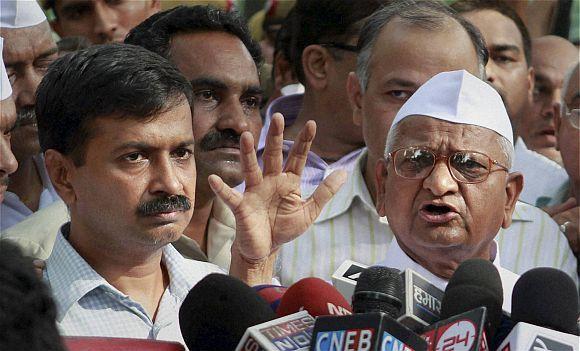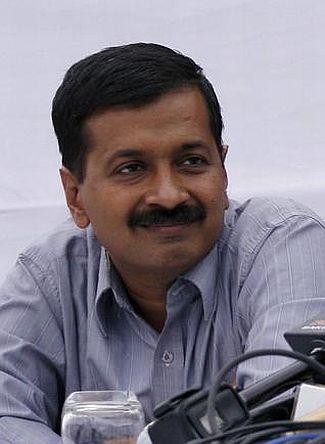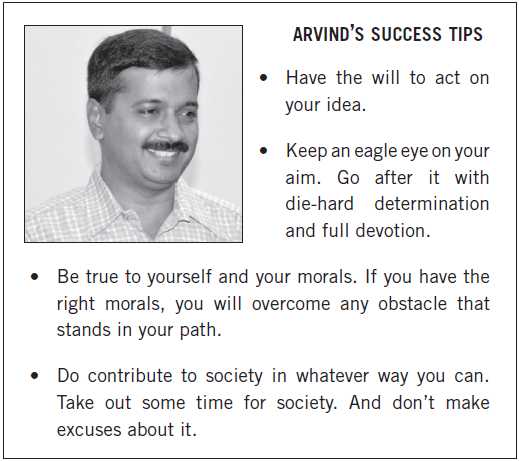 | « Back to article | Print this article |
How this IITian became an anti-corruption crusader
Excerpt from The Game Changers, a book by-IIT Kharagpur students that outlines the life and times of 20 most successful IITians.
The title of the book says it all. The Game Changers: 20 extraordinary success stories of entrepreneurs from IIT Kharagpur by current and ex-alumni from IIT Kharagpur outlines the entrepreneurial journeys of the most successful IITians from the institute.
Written by Yuvnesh Modi, Rahul Kumar (both 4th year undergraduate students at IIT-Kharagpur) and Alok Kothari (an ex-alumnus, IIT Kharagpur), the book has a foreword by Reserve Bank of India Governor Dr Duvvuri Subba Rao.
The Game Changers is a veritable list of who's who and includes names like Suhas Patil, Vijay Kumar, Vinod Gupta, Sam Dalal, Sridhar Mitta, Arjun Malhotra, Kiran Seth, Prabhakant Sinha, Ranbir Singh Gupta, Bikram Dasgupta, founder of Globsyn, Praful Kulkarni, Sunil Gaitonde, Anand Deshpande, Arvind Kejriwal, Harish Hande, Anuradha Acharya, Venkata Subramanian, Bikash Barai, Vikram Kumar, and Krishna Mehra.
Meet Arvind Kejriwal (the authors have called him Agent of Change), who, in recent times has borne the torch for an anti-corruption ombudsman under Kisan Baburao 'Anna' Hazare's leadership.
Excerpted with kind permission from the book's publishers, Random House India.
Nannu, a middle aged daily wage earner from an east Delhi slum, lost his ration card which provided his family cheap grain and other essential commodities from India's public distribution system, PDS. He applied for a duplicate ration card in January 2004.
According to the rules he should have got his ration card within ten days, but for three months he kept running around in vain. The government officers were expecting a bribe. He didn't have the money to pay the bribe and often he was not even allowed to enter the local Food and Civil Supplies Office because he was shabbily dressed.
His family and friends knew that it was no use. Nothing will change, this is India. Is desh ka kuch nahin ho sakta (nothing will happen in this country). These are the feelings that come to everyone's mind when one sees injustice meted out to a fellow citizen. This attitude of people is very difficult to change.
Please click Next to read further...
How this IITian became an anti-corruption crusader
However, Nannu approached Parivartan, the brainchild of Arvind Kejriwal. Parivartan encouraged him to file a Right to Information, RTI, application questioning why he was being denied a ration card.
On the fourth day after submitting the application, the food inspector came to his house to inform him that his card was ready. When he went to collect his card, the Food and Supply Officer, who is the head of a district, escorted him to his office room, offered him tea, gave him his card, and requested him to take back his application under the RTI Act.
Nannu, who had been running around for three months and was persona non grata in the eyes of those officers, had suddenly become a VIP! Now you can find this illiterate, confident man helping others file RTI applications.
One might think that Arvind must have been an activist in his schooldays, but he was actually a bookworm. He did nothing else but study.
This son of an engineer came all the way from the little town of Hissar in Haryana to IIT-Kharagpur in 1985 to pursue Mechanical Engineering. He was amazed to see people speaking in English but quickly grappled with the inferiority complex he suffered.
At IIT, Arvind enjoyed his life, actively participating in cultural activities and winning numerous awards. His Hindi debating skills were readily acknowledged in the campus. Arvind, known as 'Kejri' to his friends in IIT, excelled in Hindi dramatics as well.
'IIT has contributed immensely to my personality and I give the entire credit to it for whatever I am today.'
After graduating from IIT in 1989, Arvind joined Tata Steel in Jamshedpur. He recalls that it was a time when nearly 80 to 90 percent of an IIT batch used to go abroad. He knew even back then that he wanted to do something for society.
Arvind sat for the civil services examination and qualified for the Indian Revenue Service, IRS, in 1992. To get into the much coveted Indian Administrative Service, he made another attempt at the examination, and before the results were declared he travelled extensively around India.
He went into the interiors of the insurgency-hit Bodoland and other areas of the North East. His stint with Mother Teresa's Missionaries of Charity in Kolkata for two months was a complete eye-opener. He saw a lot of poverty, sick people on footpaths, some even with gangrene.
Subsequently, he joined the Ramakrishna Mission in Kolkata and then travelled all across Haryana by joining the Nehru Yuva Kendra.
He began to realise how backward these parts of India were. But he still had no answers then as to what holds back a community from development. What he did have was a whole set of questions.
Results were declared and this time too his rank fetched him the IRS only. So Arvind joined the IRS in 1993. After his training, he was posted at the income tax commissioner's Office in Delhi in 1995 as an assistant commissioner.
Please click Next to read further...
How this IITian became an anti-corruption crusader
He recounts that often chartered accountants would casually ask him if they could 'do something for me,' which he would politely refuse and show them the door.
In a few months, his reputation as an honest officer was established and the offers stopped coming. He didn't even keep a peon and used to clean up the office room himself.
'While serving in the IRS I realised the kind of power the bureaucracy enjoys. It's too much and there is absolutely no accountability and transparency. This has led to inefficiency and wanton corruption. The problem is the lack of transparency,' he says.
Gradually, Arvind realised that he couldn't do much against corruption while being in the bureaucracy. In January 2000, with a few friends, he formed Parivartan (which means 'change' in Hindi), a Delhi-based citizens' movement to work on ensuring just, transparent, and accountable governance. Its aim was to provide relief to the people who do not want to pay bribes, but are forced to pay them. Arvind calls this 'extortionist' bribery and says, 'Every single individual in the country is subject to this form of bribery in some form or the other.'
Arvind's job had given him an insight into the bureaucratic system at the income tax department. Hence, that was Parivartan's first target. Arvind started working under pseudonyms to avoid the complications that might arise from his seniors and colleagues.
In the income tax department, tax refunds and PAN allotments were being deliberately delayed in expectation of bribes. The Parivartan team met the chief income tax commissioner to inform him that they would bring to him cases where bribes were being sought, to which he agreed.
They also appealed to him to implement a few simple suggestions to make the department transparent. They put up banners across Delhi which read, 'Don't pay bribes in the income tax department. If you have a problem, contact Parivartan. We will get your work done free of cost.'
Now the commissioner berated them for putting up banners that implied that his department was corrupt. Despite that, cases through them got solved on the strength of numbers. The print media too published a few cases and they petitioned the Public Accounts Committee and the chief vigilance commissioner, adding pressure on the department. But the suggestions for transparency never got implemented.
Parivartan filed a Public Interest Litigation, PIL, in the Delhi high court in July 2000, seeking to direct the department to implement the suggestions. Arvind went on leave from his IRS job from November 2000. Manish Sisodia, a Parivartan member and a journalist, got the media to cover the campaign.
The department reluctantly filed an affidavit in April 2001 that directions had been issued for the implementation of the suggestions. However, no such direction was ever issued.
In July 2001, thirty volunteers of Parivartan sat in a peaceful protest in the corridor outside the commissioner's office. This forced him to implement the reforms.
From August 2000, Arvind, a Gandhian, had stationed himself along with other Parivartan members outside some of the offices of the Delhi Vidyut Board -- the electricity department -- every day during public dealing hours. They would exhort visitors not to pay bribes and offered to facilitate their dealings with the department free of cost.
Seven families in Maujpur had been running from pillar to post to get a new electricity connection through DVB since 1994. Each family was asked to shell out Rs 5,000 as bribe. They approached Parivartan in October 2000 and quickly got the new connections.
Please click Next to read further...
How this IITian became an anti-corruption crusader
The Parivartan members felt that people were coming to depend on the organisation without being empowered themselves. Arvind realised that while his efforts may have considerably eliminated middlemen and touts and the chances of bribery, 'We too were acting as brokers, albeit honest brokers'.
Accidentally, Arvind came across the Delhi RTI Act in late 2001, in a small newspaper report. 'We took a copy of the law which had been passed just then, studied it and found that it could be a very powerful tool. What we found was that earlier we had been acting as middlemen and were struggling with what to do. RTI provided us with the answer.'
To know how the law worked, Parivartan filed some dummy applications in departments like the Municipal Corporation of Delhi and DVB. Arvind was shocked to know that these departments were not even aware that such a law had been passed. Parivartan gave the officials copies of the law.
This didn't work, so Parivartan wrote a letter to the chief minister. The chief minister called a meeting of all the departments in January 2002 and directed them to implement the law.
Parivartan's first success story under the RTI Act was scripted in February 2002. A citizen, Ashok Gupta, had been unable to get a new electricity connection for the last two years because he refused to pay a bribe of Rs 5,000. As per the rules, a consumer is supposed to receive his electricity connection within thirty days of applying.
Instead of taking up his complaint with the department, Parivartan asked him to file an application under the RTI Act. He submitted the RTI application which Parivartan drafted, and within ten days his work was done. It was almost miraculous.
'After this we stopped taking grievances from people and the focus shifted to raising awareness and increasing participation. Within three months we helped 300 people file RTI applications and everyone got their jobs done in ten to fifteen days, some of which had been pending for several years!'
The MCD was the last department to implement RTI. On March 3, 2003, Parivartan organized a dharna outside the office of the additional commissioner and submitted an application to implement RTI. The additional commissioner said that MCD was a big department and needed time to implement.
The Parivartan members told him that they would again come back after two months and would keep sitting until RTI was implemented. Under pressure, the MCD implemented RTI.
Parivartan had its office in a slum called Sundernagri in east Delhi. Under the RTI Act they obtained copies of all the contracts given by MCD in the last two years in the area. Out of 168 contracts, they shortlisted 68 and verified them. They went from street to street.
'We would beat drums and collect people and tell them about the government schemes and the work that was supposed to have been done in their colony in the last two years. We asked them about the actual work done,' says Arvind.
Urban India's first ever Jan Sunvayi -- public hearing – was held on December 14, 2002 in Sundernagri. Around 1,000 to 1,500 people gathered. A panel chaired by a former Supreme Court judge was formed. MCD officials were present and the local MLA came. Actual work done from each of the contracts was read out.
It was found that of the 68 contracts worth Rs 1.3 crore, items worth Rs 70 lakh were missing; 59 handpumps were claimed to be installed but only 14 were found; 29 electric motors were supposed to have been installed, but not a single motor could be seen on the spot.
There were some roads which were shown to have been made two to three times within six months, but had not been made even once.
A detailed report was prepared and submitted to the chief minister and the municipal commissioner. There was no action taken. So Parivartan finally filed a PIL in the Delhi high court on the basis of which the police were directed to register an FIR.
Due to the buzz created by the Jan Sunvayi, many people came forward with their complaints about the PDS to Parivartan.
Triveni Devi had a meagre family income, with less than Rs 500 coming in per month. The ration shop at Sundernagri kept denying Triveni her quota of wheat and rice month after month. However, after six months, she approached Parivartan and filed an RTI application forcing the ration shop owner to reveal the records.
According to the books, 25 kg of wheat and 10 kg of rice were purportedly being issued to her every month and the cash memos even had her fake thumb impressions. Triveni was a literate woman and could actually sign. But before she could do anything, the shopkeeper begged her for forgiveness.
The area had almost 10,000 families and seventeen shops catering to them. Parivartan asked for records from all seventeen shops. 'At that time all the officers and shopkeepers came together and refused to give the records,' Arvind says.
Parivartan continued the battle for transparency in the dealings of ration shops for the next two years and the case even went to the Delhi high court which directed that the records be given.
'Records were burnt, Parivartan members were beaten up. In the area, over 90 percent of the grain ration was being skimmed off by shopkeepers in collusion with the food department officials,' he says.
Nineteen-year-old Santosh, a girl from the slums of Sundernagri, worked for Parivartan and was a great street organiser. On December 29, 2004 her throat was slashed by a shopkeeper. Thankfully, after several days of struggle, she survived.
After this incident, which was the seventh attack on them, Parivartan members seriously thought whether they could continue these campaigns.
Family members of the girl put pressure on her to quit Parivartan and get married. Despite this Santosh was undeterred and said, 'We can't stop like this. I have to do something to improve my country. No one is going to come from America or Japan.'
Finally, the Delhi government took notice and issued orders to clean up the PDS. Parivartan had finally won a two year-long battle.
Excerpt from The Game Changers, by Yuvnesh Modi, Rahul Kumar and Alok Kothari, with kind permission from the book's publishers, Random House India.



